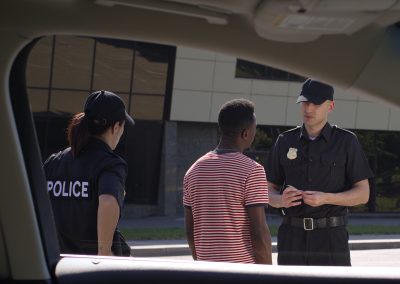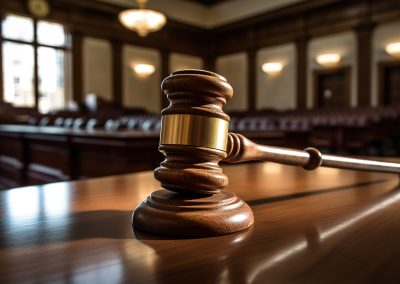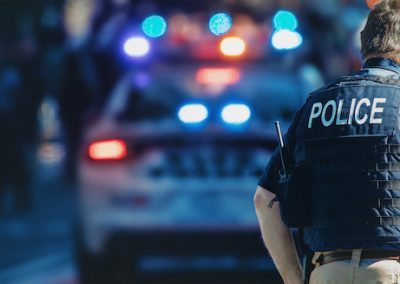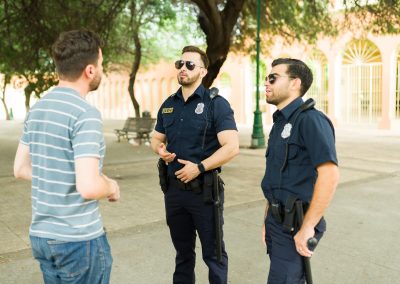Anyone talking to police trainer Jim Glennon for 5 minutes will know at least one thing: words matter. A certain word that means a lot to me has come under scrutiny lately and I think it is useful for those of us in law enforcement to spend some time talking about it.
The word warrior recently changed from a high complement into something of an insult. There are those outside of the profession who feel the “warrior mindset” is the root of all evil in law enforcement. The current trend in some political and administrative circles is to cut loose the word, redact it from our vocabulary, and, most tragically of all, allow any concepts associated with the word to wither and disappear from our profession. This would be a horrible mistake.
Warriors, Defined
Before anyone attacks or defends a concept, it is important to understand what it means. Unfortunately, warrior has been increasingly misused and misappropriated, to the point that it hardly has the same meaning to two people anymore. I could argue about the nobility of the warrior tradition, but how can I make a persuasive point when my mental image of a warrior is Alvin York and the person I’m speaking to thinks of Attila the Hun?
In the past 30 days I have heard the term warrior used to describe each of the following: a boxer, a quarterback, an MMA fighter, a cancer survivor, a politician, a personal trainer, a soldier and a horse. Are they all warriors? They are to somebody. To discuss this concept, we need to find a common understanding of the word, even if you personally may use it for something else.
Webster’s Dictionary defines a warrior as “one engaged or experienced in battle.” So, yes, conflict is inherent to a warrior’s job. For the sake of clarification I will go so far as to say physical conflict.
But does simply fighting make someone a warrior? It does not. One of the most iconic examples of a warrior is the ancient samurai. The literal translation of samurai is “those who serve close to nobility,” and here is where we find the difference between the warrior and the thug: The warrior serves. They may serve their country, city or community. But they do not engage in battle for themselves or their direct benefit.
You may already recognize this concept, but if not I will put a name to it: duty.
What about a person who fights and does so out of loyalty to a gang? Why isn’t that a warrior? Because of a concept so deeply out of fashion you might only find it institutionalized in three or four professions these days: Honor.
In his book Living the Martial Way, Forrest E. Morgan explains that honor is central to warriorship. “Honor,” he writes, “is founded on three basic tenets: obligation, justice, and courage.” When someone calls a boxer or an MMA fighter a warrior, they are not using the term in the same context as Morgan or most of the law enforcement officers I know and work with. If the politicians are using the same word to describe cops and soldiers as they are to describe Floyd Mayweather and Jonathan “War Machine” Koppenhaver, is it any wonder there is confusion?
But I doubt very seriously that any words I write or say will ever have an effect on those who already hate or resent the police. Instead, I would like to present an idea about warriorship to you, my brothers and sisters in law enforcement.
What is The Warrior Mindset?
The warrior mindset cannot just be about winning a fight. It can’t be just about making arrests. And it cannot be about putting ourselves above the communities we protect. Obligation, justice and courage: the warrior mindset must incorporate all three.
Who is my obligation to as an officer? I don’t mean this in an abstract way, I mean in a practical sense. Whom do I serve at work?
My department for starters. At some point, the department took a chance and hired me. They did not have to. They had plenty of other options. Then they trained me at considerable cost. My department gave me my uniform, my tools, my body armor and a vehicle to work from. I don’t take this for granted because I have worked for companies and departments before who did not supply any of that. But when my department gave me that uniform, it also came with a history, one built by a thousand officers who came before me. They didn’t have to, but they did, and I am obligated to them for it.
We have an obligation to the community we serve. When we arrest somebody for drunk driving, it must be done in service to the community. A businessperson makes the same arrest to build up numbers to get a promotion. A vigilante makes that arrest because the driver cusses him out. The warrior makes the arrest to take a dangerous person off the street and safeguard lives.
Next is justice. Justice is an easy concept for cops to embrace. It’s at the core of our profession. But how many times can you watch a criminal you arrested go free because of something out of your control before you start to give up on “justice?”
In truth, the courts have very little to do with what a warrior knows as justice. Justice is what separates the police officer from the gang member. A just person is a fair one. He or she believes in what it right, and that belief cannot be corrupted by the temptation of money or status. If a just person looks for approval, it is only from the people he or she respects. A just person is hardened to the jeers and insults from those they don’t respect. Justice is not revenge. Justice is what lets a warrior see what needs to be done when laws and policies don’t provide easy answers.
And finally—and in my opinion most important of all—is courage. Without courage, there is no warrior. Be careful, though, not to confuse courage with recklessness. Putting yourself in danger is not courage all on its own. A professional snowboarder isn’t a warrior just because he throws himself off a mountain for fun.
Confucius wrote, “To see what is right, and not to do it, is a want of courage.” To put it another way, courage is doing what needs to be done even when it is not easy. Yes, courage will put you in the path of danger. Hundreds of officers a year end up in the hospital or worse when a little less courage would have kept them from serving that warrant or stopping that car. But they were warriors, they knew what needed to be done, and they did it as great personal risk. They should be honored for that, not demonized.
Courage is the component missing from the current push away from the warrior mindset. Without it, it is too easy for an officer to park behind the grocery store and not see all the bad things that need a cop’s attention.
Conclusion
The belief that the only need for American warriors lies overseas is an idea built on the faulty notion that evil people only do evil things outside of our borders.
But if we are to keep the warrior tradition alive and well in our profession, we need to own it. We need to make sure we understand what that means. It is not bought out of a tactical gear catalog. It is not a prize awarded for writing the most tickets. It is earned by doing our duty, by treating people fairly, and by doing what we know to be right, even when it isn’t easy. Sometimes that means getting to kick in a door and run down a fleeing felon. Sometimes it means telling your partner he’s not making sound decisions because he’s taking things too personally.
We need to teach and practice the warrior mindset in its whole, and not just pick and choose the parts that are fun and exhilarating. Is there still a place for the warrior mindset in law enforcement? Absolutely.










0 Comments